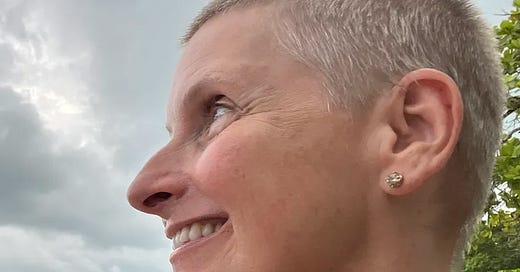
Don't Let the Sun Go Down
Alison Lowenstein finds it increasingly difficult to see—and drive—at night.

Whenever I make plans that involve a car, the first thing I do is check when the sun will set. Now that the summer is ending, I’m overcome with anxiety, as I feel my freedom is slowly fading. The truth is by the time we reach mid-fall, I will only be able to drive for a few hours during the day.
Once I entered my 40s my night vision started to get increasingly worse, and now that I’ve just turned 50 it’s almost impossible for me to drive at night. Over the past year in particular, my night vision has gotten so bad that I panic when I’m stuck in traffic at dusk. My eye doctor suggested I purchase glasses to help with this condition. Although I don’t believe a pair of glasses is a panacea for night blindness, I do think they will help with the glare. Even though I wear contacts every day, if you could see through my astigmatic eyes, you’d agree that it’s probably safest for me to stop driving at night. However, as someone who prides herself on being independent, this is hard to process, and logistically impossible in many circumstances in my life.
Why were my eyes failing me? Initially, I blamed myself for gagging at the dinner table as a child, instead of eating my carrots like my mom told me to, since (she said) they’d make my eyes strong. Guessing there was more nuance to it than that, though, I did some research on night blindness—or nyctalopia, which is the official name for this condition—and ways to treat it. Many of the articles referenced cataract surgery, but I’m a couple of decades away from that procedure. Instead, I stayed up too late trying to find holistic approaches to night blindness, wondering if there were herbal treatments to help my bad night vision and hoping the light from my tablet wasn’t making the problem worse.
It’s almost impossible for me to drive at night. Over the past year in particular, my night vision has gotten so bad that I panic when I’m stuck in traffic at dusk.
I didn’t find any substantive answers. In fact, many articles simply suggested that the best way to treat night blindness was to not drive at night. Yes, I could increase my vitamin A intake, but spinach and eggs are already a staple in my diet, so I felt I had that covered. The depressing truth, I finally realized, was that this wasn’t about a vitamin A deficiency. This was about aging.
I should probably feel fortunate that my night vision is the first thing to go on me. There are many people who suffer greater medical issues. Yes, I am perimenopausal, which interrupts my sleep and has a host of other symptoms, but that doesn’t hinder my ability to get places or dictate where I will spend the rest of my life. However, accepting that I have the inability to see at night leaves me wondering what will go next? My hearing? My sex drive? These are the thoughts that plague me when I stay at home, passing up plans that involve a car because I can’t drive in the dark.
I’m lucky to live in a city, but now I feel trapped here. As someone who has spent over a decade raising two kids on my own after my husband passed away, sticking to a budget has always been a constant concern. So, the idea of being trapped to age in an overpriced city is overwhelming. Although I grew up here, my family all lives in the suburbs now, a place that would be extremely limiting for me.
Even now, I only visit my parents and my sister in the mornings, and I manically check the clock to make sure I’m out the door with hours to spare before sunset. I worry this behavior might be construed as being rude, so I compensate by talking endlessly about my fear of getting in an accident after dark. This combination—of being distracted by the eventual setting sun and my monologuing about night blindness probably makes me insufferable—yet they keep inviting me over.
Despite all of this, I made the decision to rent a place in New Paltz with my kids. I rationalized that it was just for a week, and it was the peak of the summer, when days last forever. Everything was great until they asked to go to a movie one night. What they didn’t know was that for the entire film I replayed the six-minute drive from the theater back to the rental, which was not far from a Main Street and was well-lit. Still, I broke into a nervous sweat before the film even started, as the theater screened a seemingly never-ending series of trailers.
I had looked up the film’s running time and knew that if we didn’t stay for the credits, I could drive home with a sliver of light that remained after sunset. But even so, when we left the theater, it began to downpour. There was no light to speak of, and now I had to deal with another visual impediment—the slosh of raindrops on my windshield. I drove slowly, annoying oncoming cars with my brights, and once I got home, I felt my body finally relax.
Accepting that I have the inability to see at night leaves me wondering what will go next? My hearing? My sex drive? These are the thoughts that plague me when I stay at home, passing up plans that involve a car because I can’t drive in the dark.
I told a friend about this incident, and she confessed that her life is centered around getting an afternoon orthodontist appointment for her kids because she too doesn’t feel comfortable driving at night. She seemed embarrassed by this admission, but I actually felt relief because the truth was that I, too, was embarrassed to admit my condition to people, because it felt like it instantly aged me. However, once I opened the discussion on this (literally) dark side of aging, I discovered a slew of forty 40- and 50-year-old folk who can’t drive at night. One friend told me how ineffective night vision glasses were for them. Another spoke of the glaring lights from other cars and how it impacted their ability to see anything. Finding out that I wasn’t the only one suffering from premature night blindness added some light to my newly darkened life. It also made me realize that I don’t have to spend my waning years living the opposite of a vampire’s schedule.
No, I’m not going to ask my kids for rides, even though they are both in the process of getting their licenses. One of my kids is already in college, and I don’t believe my son wants to spend his last years of high school chauffeuring his mom around. I also don’t want my kids to ever be limited by my aging process. So, I’ll let them fly out the nest, and I’ll navigate public transportation, or occasionally splurge for a car from a rideshare app, which I still refer to as a cab, with my flock of aging friends who’ve confessed they also can’t see in the dark.

















I *can* drive at night still, but I hate it. On the back country roads near where I live people frequently are turning their brights on and off as they encounter occasional oncoming traffic, but sometimes they just leave them on and the strength of the light in my eyes combined with the particular glare of the bulbs they use for headlights now (are they LED or something? They're different than they used to be, I know.) I am literally blinded for long moments every time I pass oncoming traffic and it prompts enormous anxiety.
I’m 48 and I’ve been avoiding night driving when possible for the last four years. I’m a migraine sufferer and the new super bright headlights are hell on my eyes and head. Thank you for writing this.